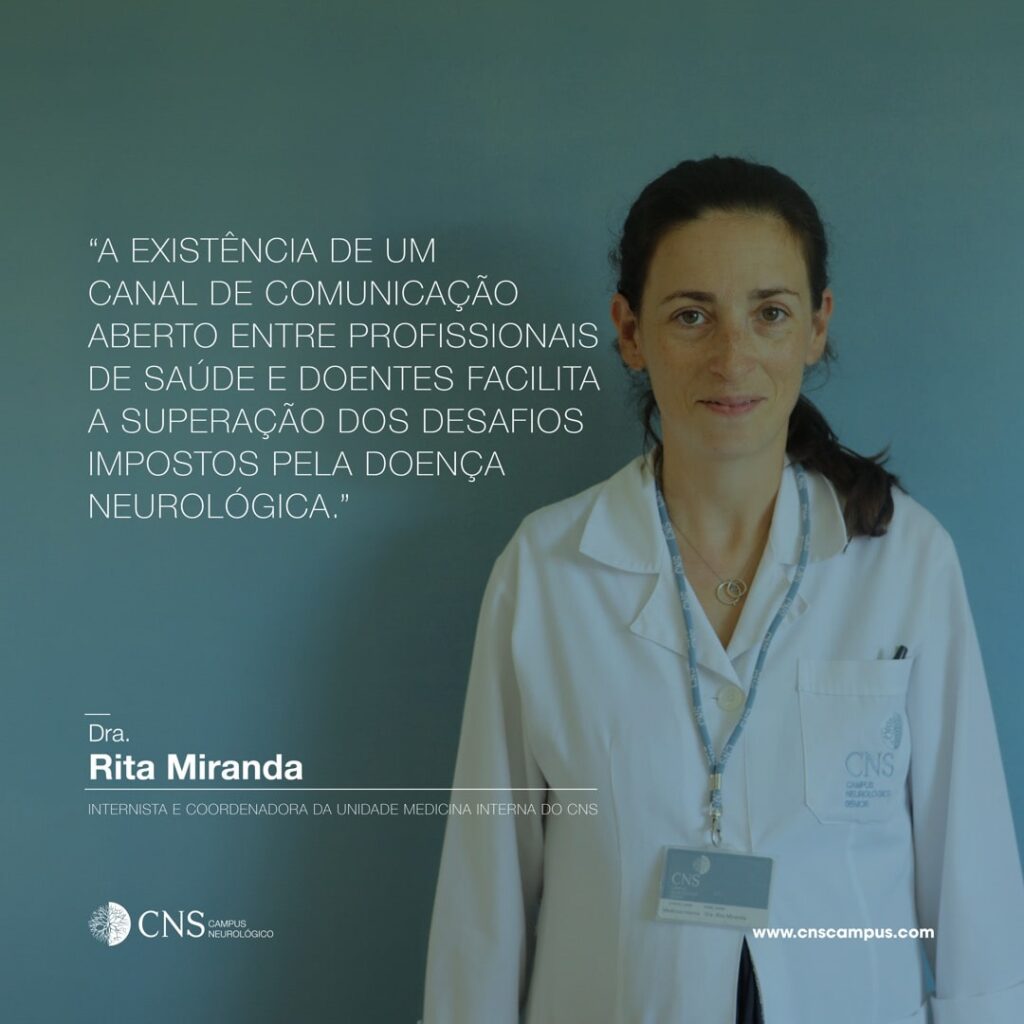On the occasion of World Patient Day, celebrated on February 11th, we share an opinion article by Dr. Rita Miranda, an Internist and Coordinator of the Internal Medicine Unit at CNS – Neurological Campus, about the importance of communication in the diagnosis and treatment of neurological diseases.
In an era where technology and artificial intelligence are playing an increasingly important role in healthcare, communication remains a key component throughout the patient approach process. It is essential from the initial evaluation and diagnosis phase, during treatment, and works between doctor and patient, but also among team members who should be multidisciplinary. It should also function between healthcare systems to which the patient may have to transition.
Neurological diseases, which encompass a distinct spectrum of conditions, from Alzheimer’s Disease, Parkinson’s Disease, Epilepsy, Stroke, to Multiple Sclerosis, are complex diseases that sometimes affect the functionality, well-being, and autonomy of patients. The diagnosis and treatment can be lengthy and challenging processes, with effective communication being a facilitator and reassuring for the patient and family.
Initially, it is through dialogue that the patient expresses their symptoms and events, allowing the doctor to reconstruct the disease history, question details that may help reach a diagnosis, and eliminate other diagnostic hypotheses. The doctor may be interested not only in data from the current disease but also from older diseases or even family history. The patient may not always provide a reliable history, and in that case, family members are crucial in establishing a timeline, providing details and nuances that complete the puzzle of diagnosing a neurological disease.
On the other hand, this communication space must be a comfort zone for the patient and family. Where they feel secure regarding the confidentiality of the data they transmit; respecting their beliefs, values, emotions, and experiences; where they can clarify their doubts about the disease and receive clear answers. Not always do the answers bring security regarding the disease’s future, so it is important to have a solid and trusting relationship, and for the patient to feel accompanied, more than just followed in a consultation.
Once the diagnosis is established, we move on to planning treatment and follow-up. It is essential that the patient understands the usefulness or effect of the treatment we propose. It is important to define a personalized care plan that the patient feels motivated and capable of executing. For diseases like Diabetes and Hypertension, which are sometimes asymptomatic, not causing discomfort for the patient, it is necessary for the patient to understand the reason why we treat them, which is Cardiovascular Disease – Heart Attacks, Strokes, among others. The same happens with Parkinson’s Disease, where the care plan may include medication taken at a strict schedule, the patient having an exercise plan supervised by a physiotherapist, following a nutritional plan, or even having an active social life. The patient’s adherence to each therapeutic proposal depends on understanding its usefulness.
Caregivers are fundamental elements in monitoring patients with neurological diseases. A well-informed caregiver about the disease can provide adequate support. They are a link to healthcare professionals and are also observers and information transmitters. They can perceive disease fluctuations and accompany day-to-day life, allowing the readjustment of the intervention plan at each consultation.
Caregivers are also affected by the disease, with caregiver exhaustion being a frequent problem, especially in patients whose caregiver is a direct family member and the patient shows behavioral changes. In these cases, it is important for them to also feel supported and find the necessary support, whether from healthcare professionals or the community.
Some neurological diseases, like dementias, can in advanced stages, present loss of autonomy and decision-making capacity. In these circumstances, where the patient cannot make decisions about themselves and their belongings, it is helpful for the family or caregiver to be knowledgeable about the patient’s will. An informed family and patient can anticipate some future decisions, such as the decision to place an alternative feeding route. In particular cases, an advance healthcare directive can help make decisions in critical moments and prevent the patient from undergoing invasive treatments in a terminal stage of the disease.
In conclusion, clear communication is crucial in the diagnosis and treatment of neurological diseases. It allows clarification for all stakeholders in the disease follow-up process, and a greater adherence and assessment of therapeutic interventions. An informed patient and caregiver are better disease managers. The existence of an open communication channel between healthcare professionals and patients facilitates overcoming the challenges imposed by neurological disease.
Dr. Rita Miranda
Internist at CNS – Neurological Campus
Coordinator of the Internal Medicine Unit
